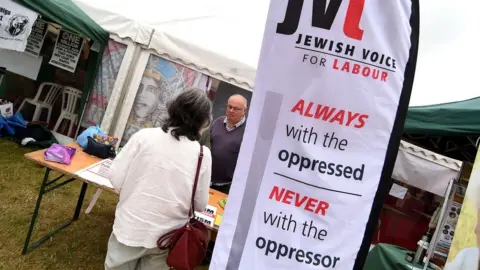Jewish group steps up pressure on Keir Starmer
 Getty Images
Getty ImagesCampaign group Jewish Voice for Labour (JVL) has stepped up pressure on Sir Keir Starmer over its claim that their members have been unfairly discriminated against by the party.
The group, which was supportive of former Labour leader Jeremy Corbyn and is critical of Israel, has long argued that its members have faced disproportionate disciplinary action under Sir Keir's leadership.
But its lawyers are now claiming that the party is breaching the 2010 Equality Act.
In July last year, former shadow chancellor John McDonnell wrote to the party's most senior official, General Secretary David Evans, claiming the "disrespectful" treatment of JVL members amounted to discrimination.
Mr McDonnell told the BBC he had received only a standard reply, and that there had been a failure to engage on the issues.
Legal challenge
Now, the legal firm, Bindmans, has sent a letter to Mr Evans on behalf of JVL - ratcheting up pressure on the party.
It suggests legal action can not be ruled out if its concerns are not addressed.
The letter claims that the party has "unlawfully" discriminated against members of the group.
JVL alleges that those who disagree with the current leadership about Israel or Palestine are suffering "a harsh disciplinary regime" - and claims its members are far more likely to be investigated for disciplinary breaches, and are far more likely to face expulsion than party members as a whole.
It says 11 out of the 12 members of its executive committee have been investigated by the party.
And it argues that the party has misconstrued criticism of Israel as antisemitism.
This, the letter suggests, is against Labour's own code of conduct, which states that "contentious views in this area will not be treated as antisemitism, unless accompanied by specific antisemitic content".
A Labour source suggested that some JVL members had faced disciplinary action not because of their activities with the group, but because they had associated with other groups which the party had, in the jargon, "proscribed" - or banned.
Two years ago, Labour's ruling body declared membership of three groups - Labour Against the Witchhunt, Labour in Exile Network, and Resist - were incompatible with party membership.
The groups had been had been criticised by party officials for downplaying the toxic antisemitism issue.
A fourth group was also banned, but for different reasons.
Complaints
The legal letter also suggests that that the party failed to investigate most complaints made by JVL members, while pursuing complaints made against them.

JVL is much smaller than the Jewish Labour Movement (JLM), which has had links to the party for a century.
It, unlike JVL, was not supportive of the Corbyn leadership.
The JLM complained to the Equality and Human Rights Commission (EHRC) about the handling of antisemitism complaints during the Corbyn era.
The EHRC subsequently found that the party had acted unlawfully.
By then, a new leader, Sir Keir Starmer, was in charge, and he accepted its findings in full.
On its website, JVL listed "15 reasons why the EHRC can and should be challenged".
Factionalism
John McDonnell has suggested a way of defusing the dispute would be for the party to re-engage the services of Martin Forde KC.
He produced a report last year examining the culture of the party, in which he found that factionalism was "endemic", and that the issue of antisemitism was weaponised by both right and left.
As there appeared to be disproportionate action against JVL, Mr McDonnell said, Mr Forde could cast an independent eye over the process.
This could potentially avoid the prospect of further legal action, he added.
The BBC has approached the Labour Party for comment, but it has not responded.
However, when Mr McDonnell approached Labour officials last year. alleging discrimination against JVL members. the party said it would always look at ways to improve its culture and practice.
But, the party added, its reformed complaints process operated "impartially, fairly and rationally",
